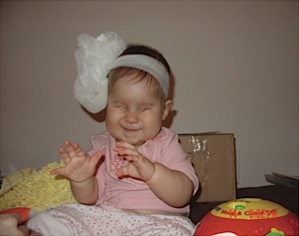Is Early Intervention Always the Best Approach for a Blind Baby?

By Anastasia
Your child is born with a very rare condition, he or she is labeled “special needs” and you, after recovering from grief and anger at the world because your child is blind, after numerous frustrating doctors’ appointments who know very little about your child’s condition, start fighting for services, all kinds of services, as many hours as you can get, because you are told that your child is at risk for developmental delays.
Sound familiar?
I guess this is a typical scenario. Trying to be a strong mommy, I started my fight for services as early as I could. I wanted as much therapy as Lydia, who was born with anophthalmia, could get. I had so much hope for all the professionals that were about to enter our life and help Lydia to “reach her potential.”
The therapies started, along with visits by a developmental specialist. Little disappointments grew into big ones. Everybody worried about paperwork, asked me the same questions over and over again, went over developmental charts and milestones asking if Lydia plays peek-a-boo or sits up… I had lots of questions and I either heard different opinions, no opinions, or off topic opinions.
I read different books about raising a child who is blind, and it was very overwhelming. I tried to incorporate strategies I had read about, which didn’t really work, and I often felt disappointed with myself, thinking that I was a bad mom and that I wasn’t doing everything I could because Lydia is behind on the typical milestones. My husband didn’t seem to care much about my research and articles, he just played with his daughter, made her laugh and wasn’t really doing the “activities” that I had read about in my articles.
My frustration was at its peak when I looked at my friends and their typical babies, who were just growing and playing, who had no therapies, no worries, no concerns about “developmental delays,” while I had to put up with crying Lydia during physical therapy sessions, because the therapist was pushing her very hard to do the same things other babies her age could do. Some therapists were just playing with Lydia the same way we did, which made me wonder why they even called it a “therapy session.”
Little by little I started to realize that Early Intervention was the cause of stress in our family and maybe even the cause of Lydia’s “being behind.” She should be treated just like every other kid, she is too young for teachers and doesn’t need therapies. When Lydia was ten months old I stopped the services and took the “special needs” and “developmentally delayed” labels off of her for a while. I let Lydia just be a baby.

These labels make us feel that Lydia is different, but she’s not. There are certain things that need to be adapted because of her blindness, but it does not mean that our life has to change in many ways. Her new plan states that the only service I demand for the next six months is Orientation and Mobility, since I want some more input on how to start teaching her to use a cane.
Lydia now is just a happy and growing baby. Her books might look a little different from other baby books because they have Braille in them and are more tactile, and she might not walk or crawl at ten months, but she is getting there. She needs me to help her find her toys and let her touch things she does not see, she needs more interactive playtime, but it does not mean she needs therapies to “speed up” her development, because they won’t.
She is her own little person, and she has the right to develop according to her own chart.
I would like to offer some advice for those of you who have babies who are blind, but please remember that the best advice is always your own instinct:
- If a professional is evaluating your baby according to a standard chart, demand that they evaluate him or her according to the developmental chart for children who are visually impaired and blind (Oregon Project is one of them).
- If a therapist makes your baby upset during a therapy session and insists that it is “good” for the baby, take action because your child is not going to make any progress if the experience is negative!
- Don’t be afraid of stating your opinion to any professional you deal with, and remember that you know your baby better than anyone else!
- Your playtime with your baby is the best therapy, so try to play and interact as much as you can.
- Adapting some toys and books and trying to give your child more auditory and tactile feedback are the most important “extras” when you raise a baby who is blind.
- The Division of Blind Services in your area is supposed to provide the necessary “equipment and resources” for your child who is blind, so put them to work! I made them buy a kiddie cane and tactile/Braille APH books for children who are blind, and the Oregon Project.

Related Posts

Eye Conditions and Syndromes, Visual Impairment
Neuralink Announces Plans to Restore Sight to the Blind with Brain Chip
Elon Musk’s company Neuralink has announced plans to begin human trials of its new “Blindsight” brain chip by the end of 2025.

IEPs
What Should I Bring to My Child’s First IEP Meeting?
Prepare for your child's first IEP meeting with confidence! Discover exactly what documents to bring, including educational records, medical info, and questions to ask.

Visual Impairment
The Gift of Understanding: How a Young Child Helps His Blind Father Navigate Life
When a parent is blind, it’s natural for people to wonder how their sighted child will adapt. Will they struggle to understand their parent’s needs? Will they feel burdened by...